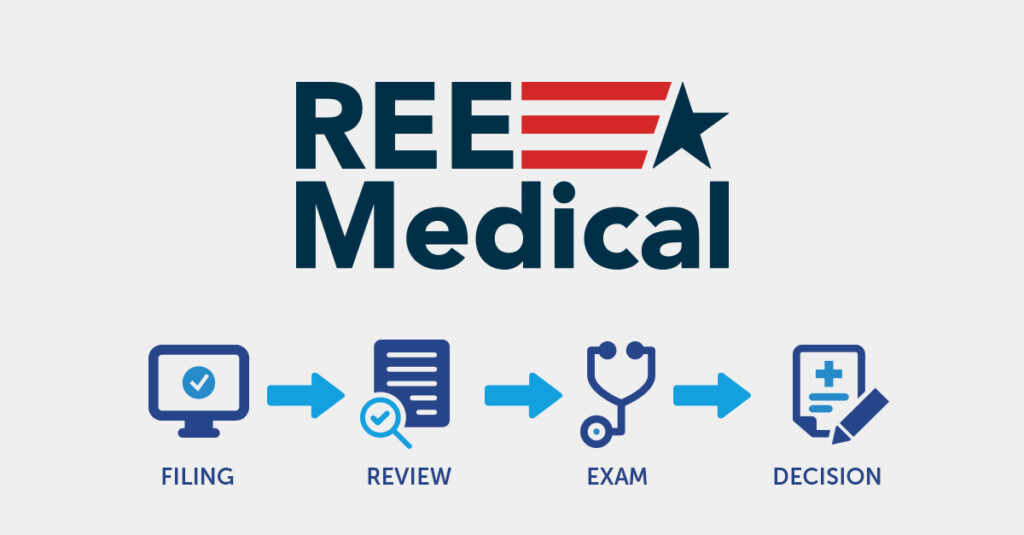This guide provides an overview of Gastroesophageal Reflux Disease (GERD) and how it is evaluated by the Department of Veterans Affairs (VA) for disability purposes. It explains how the VA currently rates GERD, summarizes recent regulatory updates, and outlines the types of medical documentation typically reviewed in these evaluations.
The guide also discusses how GERD may relate to military service, the forms of medical evidence the VA considers, and how independent medical services such as REE Medical coordinate Disability Benefits Questionnaires (DBQs) and other documentation gathered by licensed professionals.
TL;DR: Understanding How the VA Evaluates GERD Ratings
Updated VA Criteria (2024): GERD is evaluated under new guidance that considers factors such as esophageal narrowing and frequency of swallowing difficulties. Ratings may range up to 80 percent, depending on medical severity.
- Medical Relationship to Service: The VA reviews whether GERD began during service, was aggravated by it, or developed as a secondary effect of another service-connected condition.
- Evidence Reviewed: Endoscopy findings, dilation reports, and physician-completed DBQs help the VA assess the extent of impairment.
- C&P Examinations: The VA may schedule a Compensation and Pension (C&P) exam to document current symptoms and treatment responses.
- Decision Reviews: Veterans who disagree with an initial determination can access review options outlined under the Appeals Modernization Act (AMA), detailed on VA.gov.
REE Medical’s Role: REE Medical connects veterans with independent, licensed medical providers who gather objective and thorough DBQs. The company does not prepare, present, or submit VA disability claims and does not offer legal or representational services.
What Is GERD and How Does It Affect Veterans?

Gastroesophageal Reflux Disease (GERD) occurs when stomach acid frequently flows back into the esophagus, causing irritation or discomfort commonly known as heartburn. Over time, this acid exposure can lead to inflammation, tissue damage, or other esophageal complications.
Among veterans, factors such as service-related stress, dietary changes, and physical strain may contribute to the development or worsening of GERD. Persistent symptoms can interfere with eating, sleep, and overall quality of life, making consistent medical management important for long-term health.
What Are the Common Symptoms and Diagnosis Criteria for GERD?
The most common symptoms of GERD include chronic heartburn, regurgitation of acidic or sour fluid, and in some cases, difficulty swallowing (dysphagia). Physicians typically diagnose GERD by reviewing symptom history, conducting a physical examination, and using one or more diagnostic tests such as:
- Endoscopy: A camera-assisted examination of the esophageal lining.
- Barium swallow test: An imaging study tracking how swallowed liquid moves through the esophagus.
- Esophageal motility or pH monitoring: Tests that measure muscle function and acid exposure over time.
These diagnostic tools help medical professionals confirm GERD and assess its severity. Information from the Department of Veterans Affairs (VA) may be referenced when evaluating related disability claims under the Schedule for Rating Disabilities.
What Causes GERD in Veterans?
Many factors can contribute to Gastroesophageal Reflux Disease (GERD) among veterans, often involving a combination of service-related experiences and lifestyle influences. Prolonged stress—including that associated with post-traumatic stress disorder (PTSD)—can increase stomach acid production and affect digestive function.
Being overweight or engaging in physically demanding work may place additional pressure on the stomach, allowing acid to move upward into the esophagus. Certain medications—such as pain relievers or blood pressure drugs—can also relax the muscle that normally prevents reflux.
A hiatal hernia, in which part of the stomach pushes through the diaphragm, is another common factor. These physiological changes can weaken the valve between the stomach and esophagus, leading to recurring reflux.
Research shows a strong correlation between chronic stress and digestive issues, as stress hormones can increase acid secretion and reduce valve strength. Understanding these causes helps healthcare providers and evaluators assess how GERD develops and why it may be more prevalent among veterans.
How Does GERD Impact Daily Life and Veteran Health?
GERD can have a significant effect on daily well-being. Persistent reflux may make eating uncomfortable, disrupt sleep due to nighttime heartburn, and contribute to fatigue or changes in mood.
If untreated, GERD can cause complications such as esophagitis (inflammation), esophageal strictures (narrowing that makes swallowing difficult), or Barrett’s esophagus, a condition involving precancerous changes in the esophageal lining. In some cases, stomach acid entering the lungs may result in respiratory irritation or infection.
Recognizing these potential effects helps healthcare professionals determine the appropriate course of treatment and allows the Department of Veterans Affairs (VA) to accurately evaluate the medical impact of the condition.
What Are the VA Disability Rating Criteria for GERD Under DC 7206?

Gastroesophageal Reflux Disease (GERD) can significantly affect daily comfort and long-term health. Persistent reflux may make eating difficult, disrupt sleep due to nighttime heartburn, and contribute to fatigue or changes in mood.
If untreated, GERD can lead to complications such as esophagitis (inflammation of the esophagus), esophageal strictures (narrowing that affects swallowing), or Barrett’s esophagus, a condition involving changes to esophageal tissue. In rare cases, stomach acid entering the lungs can cause respiratory complications such as pneumonia.
Understanding the medical effects of GERD and the Department of Veterans Affairs (VA) rating criteria for GERD helps clinicians and evaluators assess symptom severity and determine appropriate medical documentation for review.
How Has the VA Rating for GERD Changed in 2024?
In May 2024, the VA updated its Schedule for Rating Disabilities to include a dedicated diagnostic code for GERD: Diagnostic Code (DC) 7206.
Under this code, GERD is evaluated based on objective findings such as esophageal narrowing (stricture) and the degree of difficulty swallowing (dysphagia). Previously, GERD was often evaluated by analogy to hiatal hernia criteria, but the new code more accurately reflects the specific physical impact of GERD.
This revision aligns VA rating practices with clinical evidence and provides clearer criteria for assessing severity and medical intervention needs, including the frequency of procedures such as esophageal dilation.
What Are the VA Rating Percentages for GERD: 0%, 10%, 30%, 50%, and 80%?
The VA rates GERD based on how severe your symptoms are and what medical evidence you have. Here’s a breakdown of the different rating levels under the new 2024 rules:
| Rating Level | What It Means (Key Symptoms) | What the VA Needs to See (Evidence) |
| 0% | You have GERD, but your symptoms are mild and well-controlled with medicine. | A diagnosis of GERD, but no significant issues with swallowing or esophagus damage. |
| 10% | You have some trouble swallowing sometimes, but your esophagus isn’t significantly narrowed. | Occasional difficulty swallowing, but no confirmed narrowing of the esophagus. |
| 30% | Your esophagus is starting to narrow, which can make swallowing harder. | Medical tests (like a barium swallow or endoscopy) show that your esophagus is narrowed. |
| 50% | Your esophagus is significantly narrowed, and you need procedures to widen it at least every two months. | You need to have your esophagus dilated (widened) at least six times a year. |
| 80% | Your esophagus narrows repeatedly, you need frequent widening procedures, and you’re losing weight or at risk of breathing in food/liquid. | You need dilations more than six times a year, and you’re experiencing significant weight loss or have a high risk of aspiration (breathing in foreign material). |
What Symptoms and Medical Evidence Correspond to Each Rating Level?
The Department of Veterans Affairs (VA) evaluates Gastroesophageal Reflux Disease (GERD) based on objective medical findings that demonstrate how the condition affects swallowing and esophageal function.
Relevant clinical evidence often includes:
- Endoscopy reports describe the size and condition of the esophagus.
- Barium swallow studies confirm the presence and degree of narrowing.
- Procedure records (such as dilations) show how frequently medical intervention is required.
- Documentation of complications, such as unintentional weight loss or aspiration-related breathing issues.
Accurate, up-to-date medical documentation enables the VA to assess the severity of GERD according to the criteria in Diagnostic Code 7206 (38 C.F.R. § 4.114).
What Medical Evidence Does the VA Review for GERD Ratings?
When determining a disability evaluation for GERD, the VA typically reviews:
- A confirmed diagnosis and documented history of treatment.
- Results from endoscopic examinations, barium imaging, and any dilation procedures performed.
- Reports from medical specialists describing duration, severity, and treatment response.
- Evidence of secondary effects, such as nutritional impact or respiratory complications.
This medical documentation allows the VA to objectively assess how GERD affects esophageal function and overall health under the established rating framework.
How Does the VA Establish Service Connection for GERD?

Before assigning disability compensation, the Department of Veterans Affairs (VA) must determine that Gastroesophageal Reflux Disease (GERD) is related to a veteran’s military service. This relationship, called service connection, can be established if evidence shows that GERD began during service, was aggravated by service conditions, or resulted from another service-connected disability.
Establishing service connection allows the VA to recognize GERD as a compensable condition within its disability rating system.
What Is Direct Service Connection for GERD?
A direct service connection exists when medical documentation demonstrates that GERD first appeared or worsened during active duty. Evidence often includes:
- Service treatment records noting evaluation or treatment for reflux, heartburn, or related symptoms.
- Post-service medical documentation showing continuity of care or persistent symptoms following separation.
- Clinical opinions describing a medical relationship between service events and the current diagnosis.
The VA reviews these records collectively to determine whether GERD can be reasonably linked to service.
How Can GERD Be Claimed as a Secondary Service-Connected Condition?
GERD may also be recognized as secondary to another service-connected condition when medical evidence shows that an existing disability—or the treatment for that disability—has caused or aggravated reflux symptoms. For example, psychological conditions such as post-traumatic stress disorder (PTSD) can contribute to reflux through stress-related physiological responses.
Certain medications prescribed for service-connected conditions may also irritate the stomach or esophagus, increasing the likelihood of GERD. Additionally, weight-related factors—such as reduced mobility from a service-connected orthopedic injury leading to weight gain—can place extra pressure on the stomach and worsen reflux. In these cases, a medical nexus opinion explaining the physiological connection between the conditions is often an important part of the evidence the VA reviews when determining service connection.
How Is GERD Secondary to PTSD and Mental Health Conditions Established?
The relationship between post-traumatic stress disorder (PTSD), other anxiety-related conditions, and gastroesophageal reflux disease (GERD) is well documented in medical literature. Chronic stress associated with these mental health conditions can lead to increased stomach acid production and heightened sensitivity in the digestive tract. Over time, these physiological responses may contribute to reflux symptoms or worsen pre-existing GERD.
When evaluating potential secondary service connection, the Department of Veterans Affairs (VA) typically reviews mental health treatment records, documentation of a confirmed PTSD or anxiety diagnosis, and medical opinions that describe how stress responses or related medications could aggravate reflux. A medical nexus statement from a qualified clinician often plays a key role in explaining the physiological link between mental health conditions and gastrointestinal changes.
What Medications and Physical Conditions Can Cause Secondary GERD?
Certain medications and physical health factors can contribute to or exacerbate GERD symptoms. For example, nonsteroidal anti-inflammatory drugs (NSAIDs)—commonly used for pain management—may irritate the stomach lining, while calcium channel blockers prescribed for hypertension can relax the lower esophageal sphincter, allowing acid to flow upward.
Additionally, weight-related conditions such as metabolic syndrome or limited mobility resulting from orthopedic injuries can increase abdominal pressure, promoting reflux. A hiatal hernia, where part of the stomach pushes through the diaphragm, is another frequently observed contributor.
When reviewing a case, the VA considers whether medical evidence shows that prescribed treatments or pre-existing service-connected physical conditions have contributed to or worsened GERD.
What Is the Relationship Between GERD and Hiatal Hernia in VA Claims?
Gastroesophageal Reflux Disease (GERD) and hiatal hernia frequently occur together. A hiatal hernia develops when a portion of the stomach moves upward through the diaphragm, which can allow acid to reflux into the esophagus more easily. This overlap often contributes to similar symptoms such as heartburn, chest discomfort, or difficulty swallowing.
Under the 2024 update to the Department of Veterans Affairs (VA) Schedule for Rating Disabilities, GERD is evaluated separately under Diagnostic Code 7206, while hiatal hernia continues to have its own diagnostic code. The separation of these codes allows the VA to assess each condition according to its distinct medical manifestations. When both are documented, the VA reviews clinical findings—such as endoscopy reports and physician assessments—to determine whether each condition produces independent functional limitations.
What Role Do DBQs and Nexus Letters Play in Strengthening GERD VA Claims?

When the Department of Veterans Affairs (VA) reviews a claim related to Gastroesophageal Reflux Disease (GERD), detailed medical documentation is essential. Two types of clinical evidence often referenced in these evaluations are Disability Benefits Questionnaires (DBQs) and nexus letters. These materials provide structured, professional medical insight that helps the VA understand the nature, severity, and potential causes of a veteran’s condition.
What Is a GERD Disability Benefits Questionnaire (DBQ) and How Does It Help?
A Disability Benefits Questionnaire (DBQ) is a standardized medical form used by healthcare providers to record clinical findings in a format that aligns with the VA’s rating criteria. The GERD-specific DBQ includes information such as reported symptoms, diagnostic test results (for example, endoscopies or barium studies), frequency of medical interventions, and current treatment methods.
When accurately and thoroughly completed, a DBQ ensures that all medically relevant details—such as the presence of esophageal narrowing or the frequency of dilation procedures—are clearly documented. This allows the VA to evaluate the condition objectively under the 2024 Diagnostic Code 7206 criteria.
A nexus letter, written by a qualified clinician, may also provide medical reasoning that links GERD to a veteran’s military service or to another service-connected condition. Together, these documents form an important part of the medical evidence the VA reviews when determining service connection and severity.
How Does a Nexus Letter Establish Service Connection for GERD?
A nexus letter is a medical opinion written by a qualified clinician that explains the relationship between Gastroesophageal Reflux Disease (GERD) and a veteran’s military service or another service-connected condition. Rather than simply stating that GERD began during service, a well-supported nexus opinion provides the medical reasoning behind that conclusion.
Clinicians typically review service treatment records, post-service medical history, and relevant medical research to describe how the condition could have developed or been aggravated by service-related factors. This explanation—sometimes referred to as the “etiological rationale”—helps the Department of Veterans Affairs (VA) understand the physiological basis for the claimed relationship. A detailed and well-reasoned nexus letter is often an important component of the medical evidence the VA evaluates, particularly in secondary service connection determinations.
How Does the VA Appeals Process Work for GERD?

When a Gastroesophageal Reflux Disease (GERD) claim is denied or assigned a lower evaluation than expected, veterans have the right to request a review of the decision. The Department of Veterans Affairs (VA) offers several decision-review options that allow additional evidence to be considered or an existing decision to be re-examined.
Under current regulations, most appeals begin with a Notice of Disagreement (NOD), which must generally be submitted within one year of the decision notice. After the NOD is received, the VA issues a Statement of the Case (SOC) outlining the reasons for the determination and summarizing the evidence reviewed. Veterans may then choose among review options provided under the Appeals Modernization Act (AMA)—such as a Supplemental Claim, a Higher-Level Review, or an appeal to the Board of Veterans’ Appeals (BVA). Each pathway offers an opportunity to present additional medical documentation or request further review.
What Types of Evidence Are Reviewed During a GERD Appeal?
During the appeal process, the VA re-examines all available medical and administrative evidence related to the claim. This may include:
- Updated Disability Benefits Questionnaires (DBQs) or recent endoscopy reports showing changes in esophageal narrowing or symptom frequency.
- Nexus opinions from qualified clinicians that medically explain how GERD relates to military service or another service-connected condition.
- Documentation of associated complications, such as nutritional issues or weight fluctuations, if medically relevant.
Comprehensive and current medical records enable the VA to reassess the level of impairment under Diagnostic Code 7206 and determine whether a different evaluation is warranted.
How Does REE Medical Simplifies the Medical Evidence Process for Veterans
At REE Medical, our goal is to make it easier for veterans to get clear, objective medical documentation that accurately reflects their health. We work with a network of independent, licensed medical professionals who perform detailed evaluations and complete Disability Benefits Questionnaires (DBQs) and medical opinions in line with VA standards.
While REE Medical isn’t part of the VA and doesn’t prepare or submit claims, our coordinated process helps ensure that the medical evidence you provide is complete, credible, and ready for VA review.
REE Medical’s Role in Evidence Coordination
REE Medical coordinates with independent, licensed medical professionals who prepare DBQs and clinical evaluations designed to accurately document a veteran’s medical condition. These documents can provide the VA with clear, standardized medical evidence for review.
REE Medical does not prepare, present, or submit VA disability claims, and does not offer legal or representational services.
What Are Common Questions About VA Ratings for GERD?

Many Veterans have questions about how GERD is rated by the VA. Here are some of the most common ones:
What Is the Highest VA Disability Rating for GERD?
Under the 2024 VA rating schedule (Diagnostic Code 7206), the highest evaluation for Gastroesophageal Reflux Disease (GERD) is 80%. This level applies to cases involving frequent esophageal narrowing, the need for repeated dilation procedures, and associated complications such as significant weight loss or aspiration risk.
Can GERD Be a Secondary VA Claim to PTSD?
GERD may be recognized as secondary to post-traumatic stress disorder (PTSD) when medical evidence shows that chronic stress or anxiety has contributed to or aggravated reflux symptoms. The VA typically reviews mental health treatment records and medical opinions describing this physiological connection.
Is GERD a Presumptive Condition Under the PACT Act?
GERD is not classified as a presumptive condition under the PACT Act. However, if medical evidence indicates that toxin exposure—such as from burn pits—has aggravated GERD symptoms, the VA may review the condition as part of a broader service-connection evaluation.
What Is a DBQ for GERD and Why Is It Important?
A Disability Benefits Questionnaire (DBQ) for GERD is a standardized medical form that records symptoms, diagnostic findings, and treatment details. It allows the VA to review medical information in a consistent format aligned with its rating criteria.
How Does the VA Review Requests for Increased GERD Ratings?
Requests for increased evaluations are based on new or updated medical evidence showing a change in the condition’s severity. The VA may consider recent DBQs, endoscopy results, or documentation of complications such as weight loss or swallowing difficulty when reassessing GERD ratings.
How Does REE Medical Support Veterans with GERD-Related VA Documentation?

Navigating the Department of Veterans Affairs (VA) disability process can feel complex, especially when ensuring that medical records fully reflect the impact of Gastroesophageal Reflux Disease (GERD). REE Medical helps veterans by coordinating access to independent, licensed medical professionals who gather objective clinical documentation in accordance with VA evidentiary standards.
What Services Does REE Medical Offer for GERD Evaluations?
REE Medical connects veterans with a nationwide network of qualified healthcare providers experienced in completing Disability Benefits Questionnaires (DBQs) and comprehensive medical evaluations. These assessments translate complex medical findings, such as reflux severity, esophageal narrowing, or related complications, into clear, evidence-based documentation the VA can review with confidence.
Every clinician operates independently, providing an objective medical assessment supported by diagnostic testing and medical history. REE Medical facilitates this process to ensure veterans receive accurate, comprehensive documentation that meets VA evidentiary standards. REE Medical’s coordinated approach empowers veterans with the medical evidence needed for a fair and informed VA review.
Requesting a Free Medical Evidence Consultation for GERD
Living with GERD can be exhausting, and many veterans want to be sure their medical records truly capture how the condition affects their daily life. REE Medical offers a complimentary consultation designed to help you understand how independent, licensed medical providers can document your condition in a way that meets VA review standards.
During your consultation, you’ll learn how REE Medical coordinates thorough, evidence-based evaluations, such as Disability Benefits Questionnaires (DBQs) and supporting medical reports, that provide a clear, objective picture of your health.
This consultation is a chance to see how stronger, more detailed medical documentation might help ensure your records accurately reflect the current severity of your GERD.
Why Trust REE Medical for Accurate Medical Evidence in GERD Claims?
REE Medical works with a nationwide network of independent healthcare professionals experienced in documenting complex conditions such as GERD. Many members of the REE Medical team are veterans themselves and understand the importance of accurate, credible medical evidence in VA evaluations.
At REE Medical, we know that behind every file is a story, and for many of us, it’s personal. Our nationwide network of independent healthcare professionals is experienced in documenting complex conditions like GERD with the precision and clarity the VA expects. Many members of our own team are veterans, which means we understand what it feels like to be on the other side of the process.
Every evaluation coordinated through REE Medical is designed to be thorough, evidence-based, and aligned with VA documentation standards. Our role is to make sure your medical evidence is complete, credible, and ready for the VA’s review.
Frequently Asked Questions
What lifestyle changes can help manage GERD symptoms for Veterans?
The Department of Veterans Affairs (VA) and the National Institute of Diabetes and Digestive and Kidney Diseases (NIDDK) note that certain lifestyle factors can affect gastroesophageal reflux disease (GERD) symptoms. Maintaining a healthy weight, avoiding foods that trigger reflux (such as spicy or high-fat meals), and reducing tobacco or alcohol use can all help minimize discomfort. Eating smaller meals, elevating the head of the bed, and engaging in moderate physical activity may also contribute to symptom improvement.
Are there specific medications known to worsen GERD?
The Department of Veterans Affairs (VA) and the National Institute of Diabetes and Digestive and Kidney Diseases (NIDDK) note that certain lifestyle factors can affect gastroesophageal reflux disease (GERD) symptoms. Maintaining a healthy weight, avoiding foods that trigger reflux (such as spicy or high-fat meals), and reducing tobacco or alcohol use can all help minimize discomfort. Eating smaller meals, elevating the head of the bed, and engaging in moderate physical activity may also contribute to symptom improvement.
How can Veterans document their GERD symptoms for VA claims?
When reviewing claims related to GERD, the VA generally considers medical evidence such as endoscopy results, diagnostic imaging, treatment records, and physician evaluations describing symptom frequency and impact on daily life. A Disability Benefits Questionnaire (DBQ) completed by a qualified medical provider can also help document the severity and ongoing nature of GERD in a standardized format.
Note: REE Medical coordinates independent, licensed medical professionals who provide objective DBQs. REE does not prepare, present, or submit VA claims.
What role does diet play in managing GERD for Veterans?
Dietary adjustments are a well-established part of GERD management. The NIDDK and VA Health Library highlight that limiting acidic or spicy foods, incorporating high-fiber meals, and avoiding large meals before lying down may support symptom control. Registered dietitians experienced in gastrointestinal disorders can provide individualized nutritional guidance based on evidence-based approaches.
Can GERD lead to other health complications for Veterans?
If left untreated, GERD can lead to complications such as esophagitis (inflammation of the esophagus), esophageal strictures (narrowing that causes swallowing difficulty), or Barrett’s esophagus, a condition that increases the risk of esophageal cancer. According to the National Institutes of Health (NIH), chronic reflux may also contribute to respiratory issues, such as aspiration pneumonia, when stomach acid enters the airways.
What is the importance of a nexus letter in GERD claims?
When it comes to VA evaluations, strong medical documentation matters. REE Medical helps veterans get the clarity they deserve by connecting them with independent, licensed providers who take the time to understand their health and document it thoroughly. These evaluations give the VA a clear, evidence-based picture of your condition, no claims handling, just honest, professional medical documentation.
How can Veterans find support groups for GERD?
Veterans can find educational and peer support resources through several organizations:
- The VA Health Library and VA Whole Health program provide guidance on managing chronic digestive conditions.
- The American Gastroenterological Association (AGA) and the International Foundation for Gastrointestinal Disorders (IFFGD) offer research-based materials and patient support networks.
- Many VA medical centers host chronic condition management groups where Veterans can discuss experiences and coping strategies with peers.
Conclusion
Understanding how the VA evaluates GERD under the new 2024 rules helps veterans recognize what medical evidence is typically reviewed during a disability assessment. The VA now considers factors such as esophageal narrowing, swallowing difficulty, and the frequency of required procedures when assigning a rating. Independent medical documentation, such as updated DBQs or endoscopy reports, allows the VA to see a clear, objective picture of a veteran’s current condition.
Don’t let the complexities of the VA process discourage you. Take the next step toward clarity by exploring how REE Medical can help you obtain the thorough, evidence-based medical documentation that ensures your condition is accurately represented.
Schedule a Free Consultation Today
Disclosure
DISCLAIMER: REE Medical, LLC is not a Veterans Service Organization (VSO) or a law firm and is not affiliated with the U.S. Veterans Administration (“VA”). Results are not guaranteed, and REE Medical, LLC makes no promises. REE Medical’s staff does not provide medical advice or legal advice, and REE Medical is not a law firm. Any information discussed, such as, but not limited to, the likely chance of an increase or service connection, estimated benefit amounts, and potential new ratings, is solely based on past client generalizations and not specific to any one patient. The doctor has the right to reject and/or refuse to complete a Veteran’s Disability Benefit Questionnaire if they feel the Veteran is not being truthful. The Veteran’s Administration is the only agency that can make a determination regarding whether or not a Veteran will receive an increase in their service-connected disabilities or make a decision on whether or not a disability will be considered service-connected. This business is not sponsored by, or affiliated with, the United States Department of Veterans Affairs, any State Department of Military and Veterans Affairs, or any other federally chartered veterans service organization.





